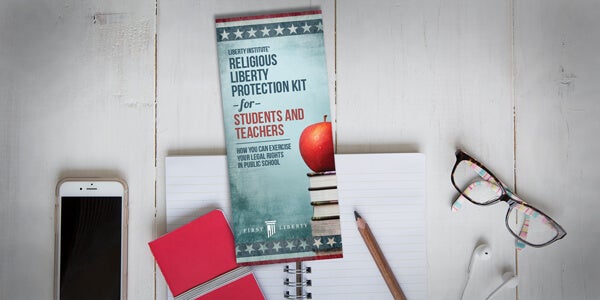
Attacks on our students’ religious freedom are happening across the country at an alarming rate. In this series, First Liberty gives you practical ways you can equip your kids for the upcoming school year – not just for academic success, but also to help them to stand up for their faith and their Constitutional rights!
Fall classes are right around the corner. And that means you’ll likely be hurrying to your nearest store to get school supplies. After all, you wouldn’t want your kids showing up to class unprepared, right?
Here at First Liberty, we share that feeling. The last thing we want is young minds wandering into classrooms without the proper tools for success. That includes the essentials for defending their religious liberty.
Too often, students fail to understand that they have the right to bring their religious beliefs into the classroom. Why? Because opponents have given the misguided impression to America’s students that they must leave their faith behind when they enter the school – or at the very least, confine their religious convictions to the bottom of their backpacks.
Like, the way bottom.
Fortunately, we can chalk one up for some real truth. And that is, that students – as well as teachers and staff – do, in fact, have First Amendment religious rights inside public schools. The Constitution, the law, and decades of legal precedent protect those rights.
So before starting the upcoming school year on the wrong foot, First Liberty keeps you one step ahead by offering you the following three religious freedom essentials to equip and inform your children on their Constitutional rights.
1. Schools cannot censor faith-based remarks from student graduation speeches.
Students across America work very hard to attain the privilege and honor of delivering remarks at their much-anticipated graduation ceremony.
At the last minute, however, school officials often get nervous about the student making religious references in their speech – and they choose to censor or edit the remarks, which only leads to a disappointing outcome and the student feeling like their once-in-a-lifetime moment has been ruined. This is one of the most common religious freedom violations we encounter.
Recently, First Liberty had to step in to defend Sam Blackledge, a co-valedictorian in Illinois who experienced that exact scenario. And we’ve intervened in several similar cases in the past – including our defense of two other graduating seniors, Moriah Bridges and Brooks Hamby.
However, it’s always best if we can help you prepare for – or even prevent – these types of incidents. Before delivering graduation remarks, let your young graduate know their rights. Tell them to remind school district officials and school administrators that they cannot discriminate against students who wish to incorporate religious speech or even prayer in their graduation addresses.
2. Students’ private religious speech is not government speech.
How should you respond when school district officials or any other public school administrator tells you that allowing students’ religious speech might be seen as the school “establishing a religion?”
There is an important distinction between government speech (the speech of the school district and its employees) and private student speech. Although there are some limits that apply to government speech, the Constitution fully protects a student’s private religious expression. In essence, the proper role of a school is to remain neutral and accommodating toward private expressions of religious belief.
For example, First Liberty has successfully defended the Kountze Texas Cheerleaders on various occasions and affirmed their right to display religious messages in run-through banners during football games. Despite opponents’ obstinate efforts to claim that this is not protected speech, the First Amendment protects these cheerleaders to express their faith using these banners.
3. Supreme Court precedent protects students’ religious expression inside schools.
Almost fifty years ago, in Tinker v. Des Moines ICSD, the U.S. Supreme Court declared that neither teachers nor students “shed their constitutional rights to freedom of speech or expression at the schoolhouse gate.” More specifically, the First Amendment prohibits a school district and its employees from being hostile toward religious belief and expression. Unlike government, students may engage in specific religious beliefs or practices.
Students can, for example, pray during lunch, recess, or other designated free time. They may read the Bible or other religious materials at school, during non-instructional time or when students are free to choose their own reading material, share their faith with fellow students between classes, and they can give out gifts with religious messages at school parties.
And those aren’t the only protected religious activities. In our Religious Liberty Protection Kit for Students and Teachers, we give you a more complete and detailed list of what, when, and how your children engage in religious speech in accordance with the Constitution and the law.
We encourage you to download our Protection Kit or contact us to receive a copy!
In short, let your kids know that the highest court in America has long protected their religious expression, and they need not be afraid to live out their faith while in school.
Questions about your students’ rights in school?
Our legal experts offer you practical answers.
![]()
Students, has your school censored your religious speech?
Request legal assistance from our attorneys today!
![]()
Liberty Watch News is brought to you by First Liberty’s team of writers and legal experts.